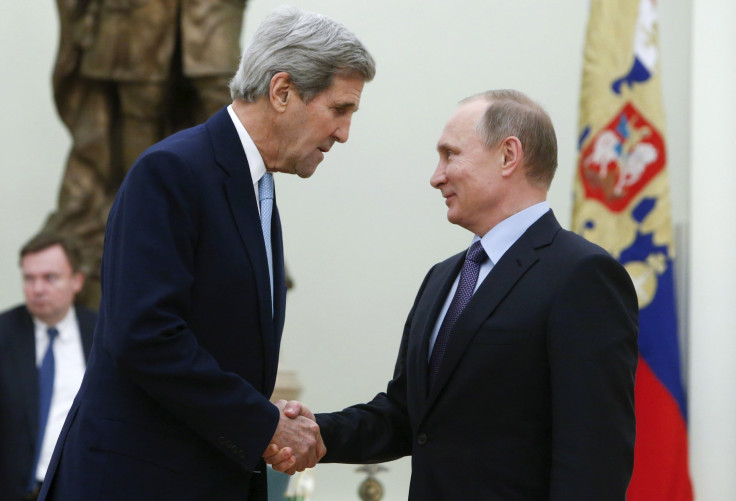Russia Cracks Down On Human Rights, Ukrainian 'Spy' During John Kerry Visit

On the same day Russian President Vladimir Putin met with U.S. Secretary of State John Kerry to discuss the ongoing wars in Syria and Ukraine, Putin signed a decree allowing Russia’s Constitutional Court to decide whether to accept the rulings of international human rights courts and a Moscow court sentenced a Ukrainian citizen to 11 years in prison for espionage, local media reported. The provocative moves come as Russia continues airstrikes in Syria and presses Ukraine to implement the Minsk agreement to end the conflict there.
The law signed by Putin will allow Russia to reject the decisions of the European Court of Human Rights in a move advocacy group Human Rights Watch said could “delay justice even further for human rights victims.” The decision comes after the European Court of Human Rights ordered Russia to pay more than $2 billion to shareholders of the former Yukos oil company. The court found the Kremlin had violated the European Convention on Human Rights in 122 cases in 2014.
“I don’t see any problem there, I think that people are worrying for nothing,” said Valery Zorkin, the head of Russia's Constitutional Court, when addressing the new law.
The new legal decision could directly affect cases like that of Ukrainian citizen Valentin Vygovsky, who was sentenced Tuesday to 11 years in a penal colony for espionage. Russian media reported that Vygovsky had been detained in 2012 for trying to obtain classified information from aircraft and spacecraft companies. Other reports said he was detained in 2014 in his native Crimea. It was unclear which country Vygovsky was allegedly spying for. His lawyers said they would appeal the ruling, while Ukraine's Foreign Ministry called for his release.
Several Ukrainian citizens have been sentenced to lengthy prison terms as Russia continues to deny playing any direct role in the conflict in eastern Ukraine that has left more than 9,000 people dead. In August, Ukrainian filmmaker Oleg Sentsov was sentenced to 20 years in prison for allegedly planning terror attacks in Crimea. Crimean activist Alexander Kolchenko, who was tried along with Sentsov, received 10 years.
In the most high-profile case, Ukrainian helicopter pilot Nadiya Savchenko has been accused of killing two Russian journalists and remains in detention in Russia. Russian media reported earlier this month that her sentence would be announced in 2016. She faces up to 25 years in prison and continues to deny all the charges against her.
© Copyright IBTimes 2025. All rights reserved.






















